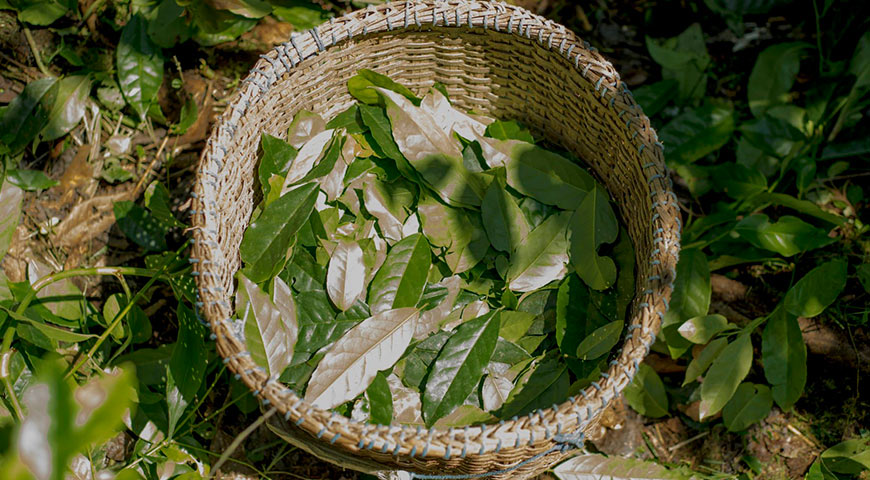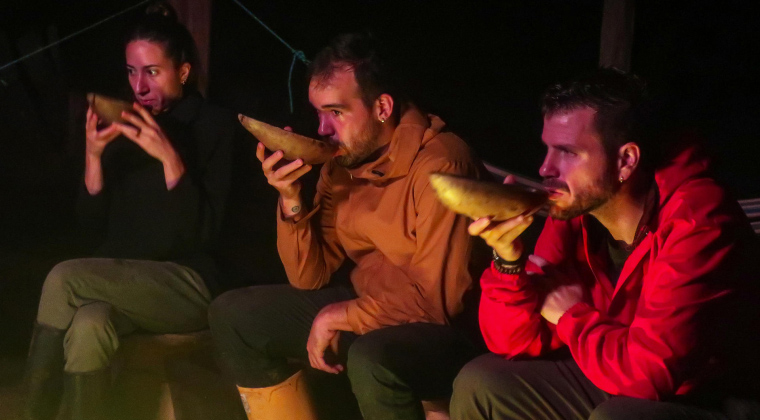

In the early pre-dawn hours, the Achuar community of Sharamentsa in the Ecuadorian Amazon performs an ancient ritual involving the consumption of guayusa. This green-leaf infusion provides them with energy for the day and serves as a moment for communal sharing and reflection.
In the isolated Amazonian village of Sharamentsa, situated on the Ecuador-Peru border by the Pastaza River, the Achuar people start their day with a long-standing tradition. While most of the world is still asleep, they awaken at three in the morning to partake in the guayusa ceremony. This ritual, revolving around a powerful tea made from the green leaves of the guayusa plant, offers both physical stimulation and cultural significance, reinforcing family connections and enabling communal introspection.
The guayusa plant, referred to as ‘wayus’ in Achuar, is native to the Amazon and valued for its energizing and antioxidant qualities. The women of the community gather, dry, and prepare these revered leaves, boiling them overnight to have the infusion ready by dawn. Edwin Yunkar, a member of the Sharamentsa community, explains the method and importance of this practice.
Historically, guayusa was consumed to provide energy for hunting and fishing. Today, it remains integral to the Achuar, helping them to clear their minds and gear up for the day’s activities. After consuming up to five traditional bowls of guayusa, they often induce vomiting as a form of physical and spiritual purification, followed by discussions about dreams, which are believed to carry significant symbolic meaning.
The guayusa ceremony is more than just a morning ritual; it is a moment for family interaction, problem-solving, and crafting. As dawn arrives, the ritual transitions into an educational opportunity where elders impart ancestral knowledge to younger generations. Yunkar emphasizes the significance of this cultural transmission, noting that children learn not only the customs but also broader aspects of Achuar heritage.
“We use the guayusa ceremony to teach our children about our cultural knowledge because it was passed down to us by our parents,” Yunkar says. This practice ensures the preservation and continuation of the Achuar’s rich traditions across generations.
Dream interpretation is a crucial element of Achuar culture, deeply embedded in their daily lives. They believe that dreams contain symbols that can significantly influence their actions and decisions. Following the guayusa ritual, time is devoted to interpreting these dreams. Yunkar elaborates on the dual nature of dreams: “There are good dreams and bad dreams, of luck and evil.” Understanding and interpreting these dreams, particularly the negative ones, is vital for avoiding potential dangers.
The elders possess the most profound dream interpretation knowledge, but this wisdom is gradually passed on to the youth. Over time, younger members learn to analyze their dreams using past experiences and teachings from their elders.

Yunkar shares a personal story to illustrate the role of dreams in guiding daily actions. He recounts a dream where a fallen stick injured his foot while crossing a river. Ignoring the dream, he later went to the river with his family and was stung by a stingray, mimicking the sensation from his dream. This experience highlights the importance of paying attention to dream warnings.
Conversely, dreaming of people playing or eating at a table is often seen as a sign of good fortune. Over time, individuals learn to differentiate between good and bad dreams, drawing from personal experiences and inherited wisdom.
The guayusa ritual concludes as the first light of day illuminates the community, signaling the start of a new day. The Achuar will gather again the next morning to continue this practice, perpetuating their cultural preservation and communal unity.
The guayusa ritual stands as a powerful symbol of the Achuar people’s cultural resilience. Despite modern pressures, the Sharamentsa community remains dedicated to upholding their traditions with unwavering devotion. This daily practice underscores their deep connection to their ancestors and the natural world that supports them.
Drinking guayusa and interpreting dreams is more than just a cultural activity; it embodies the Achuar’s identity and worldview. This ritual reflects their holistic approach to life, intertwining physical health, spiritual well-being, and social harmony.
In a world increasingly disconnected from nature and tradition, the Achuar’s dedication to preserving their customs offers valuable insights into the significance of cultural heritage. Their rituals remind us of the richness and diversity of human experiences and the importance of safeguarding these traditions for future generations.

While the guayusa ritual is a cornerstone of Achuar culture, it faces challenges from external influences, environmental changes, and economic pressures. However, the Achuar are actively working to preserve their way of life.
Community initiatives and collaborations with cultural preservation organizations are vital in safeguarding the guayusa ritual and other traditions. Education is crucial in these efforts, ensuring that younger generations grasp the importance of their heritage and are prepared to uphold it.
By documenting their rituals and sharing their stories with a wider audience, the Achuar are raising awareness about the value of cultural preservation. These efforts not only protect their traditions but also foster greater appreciation for indigenous cultures worldwide.
The guayusa ritual has attracted global attention for its health benefits. Guayusa leaves are rich in antioxidants and offer a natural source of sustained energy, making them an appealing alternative to conventional stimulants.
As interest in natural and holistic health grows, the global market for guayusa products has expanded. This presents opportunities for the Achuar and other indigenous communities to share their traditional knowledge and gain economically from guayusa cultivation and sales.
However, it is crucial to approach this commercialization with respect for the cultural significance of guayusa. Efforts to introduce guayusa into global markets must prioritize fair trade practices and ensure that indigenous communities retain control over their traditional resources.
The guayusa ritual of the Achuar people of Sharamentsa is more than just a morning ceremony. It is a deeply ingrained cultural practice that encompasses physical revitalization, spiritual cleansing, and communal connection. As the community gathers before dawn, they reinforce their bond with their ancestors and each other.
The focus on dream interpretation underscores the Achuar’s unique worldview, where the spiritual and physical realms are closely linked. Dreams are viewed as important messages that can guide daily actions and decisions.
Through this ritual, the Achuar maintain a sense of continuity and stability in a changing world. It serves as a cornerstone of their identity, offering purpose and direction. The guayusa ceremony stands as a testament to the enduring power of tradition and how cultural practices can adapt and flourish in modern times.
As dawn breaks over the Amazon rainforest, the Achuar community of Sharamentsa completes their guayusa ritual, prepared to face the new day with renewed vigor and clarity. This daily practice is not just a source of sustenance but a crucial connection to their past and a guiding light for their future.
The guayusa ritual exemplifies the resilience and strength of the Achuar people, celebrating their heritage and values while inspiring efforts to preserve and honor cultural traditions. In a world often focused on progress, their commitment to their rituals serves as a poignant reminder of the importance of staying connected to our roots.

Leave a Comment